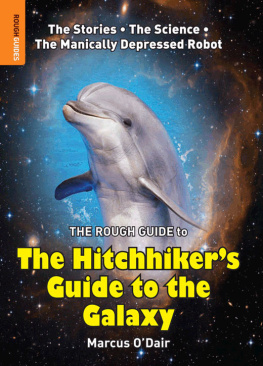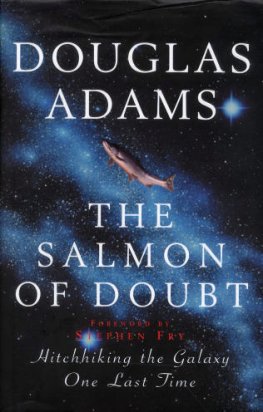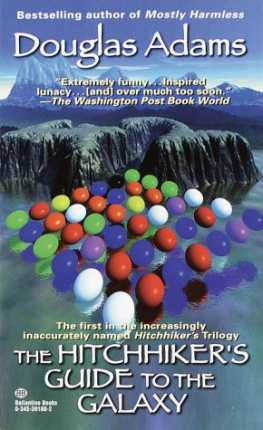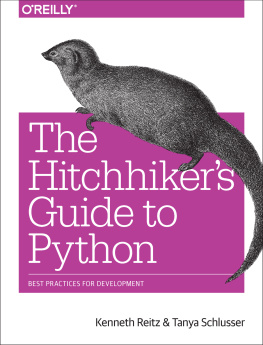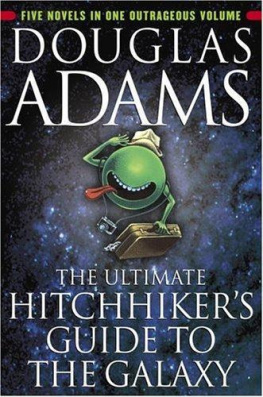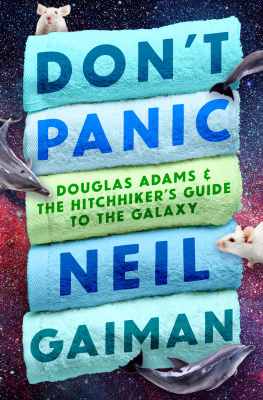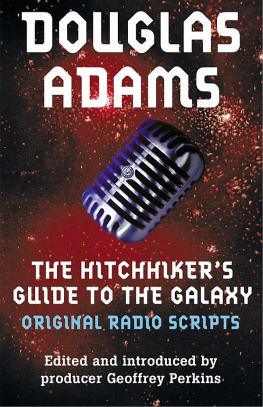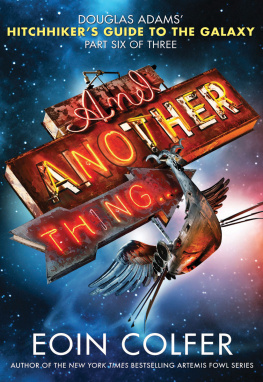Publishing information
The first edition published Oct 2009 by
Rough Guides Ltd. 80 Strand, London, WC2R 0RL
Email: mail@roughguides.com
Distributed by the Penguin Group:
Penguin Books Ltd. 80 Strand, London, WC2R 0RL
The publishers and authors have done their best to ensure the accuracy and currency of all information in The Hitchhikers Guide to the Galaxy; however, they can accept no responsibility for any loss or inconvenience sustained by any reader as a result of its information or advice.
No part of this guide may be reproduced in any form without permission from the publisher except for the quotation of brief passages in reviews.
Marcus ODair, 2009
ISBN 13: 978-1-84836-242-0
This Digital Edition published 2010. ISBN: 9781848367135
E-Book format prepared by DK Digital, London and DK Digital Media, Delhi.
Introduction
Dont Crash, the documentary about the Hitchhikers movie, bears the tongue-in-cheek subheading The Documentary of the Making of The Film of The Book of The Radio Series of The Hitchhikers Guide to The Galaxy. The Rough Guide to The Hitchhikers Guide to the Galaxy is not quite as ridiculous a title, but it might still sound uncomfortably like pop culture eating itself. (A guide to the Guide?, would ask the hypothetical dinner party hostess, just before her undergarments leapt one foot to the left in accordance with the Theory of Indeterminacy. Darling, how very postmodern.)
Yet over thirty years since Douglas Adamss original radio series was broadcast, the Hitchhikers universe continues to absorb and amuse on a tremendous scale: around 16 million novels have been sold alone. More remarkably, the best part of a decade after Adamss tragically early death, the canon is still expanding. Three further Phases of the radio series have appeared since 2004, while a film version finally arrived in 2005. Four years later, a sixth Hitchhikers novel, by bestselling childrens author Eoin Colfer, is about to be published as we go to press.
For a certain generation, that novel, entitled And Another Thing, will represent a first taste of Hitchhikers. This guide aims to fill in some background for such a reader, who is looking to understand the size and scope of the curious phenomenon upon which theyve stumbled. Equally, however, the intention is to offer something for the longtime fan, hooked ever since the first radio episode was aired on 8 March 1978 and familiar with every subsequent development in every format from computer game to comic.
As such a devotee would no doubt tell you probably at considerable length, until, like the President of the Mid-Galactic Arts Nobbling Council at an Azgoth poetry recital, your only means of survival lies in gnawing your own leg off Hitchhikers is a story of considerable depth. This book looks, for instance, at the real-life science behind time travel and the Total Perspective Vortex; the echoes in Adamss writing of Zen Buddhism and existentialist philosophy; and the impact of filtering the storys best-known gag, that the meaning of life is 42, through a tridecimal numeral system.
For the neophyte, however, the overriding instruction is that inscribed upon the cover of The Hitchhikers Guide to the Galaxy itself: Dont Panic. Hitchhikers is also a comic space opera, plain and simple; an absurdist but highly accessible intergalactic romp. As well as the series links to science and philosophy, this guide contains thoroughly straightforward information about the main characters and the most prominent versions of the story, including radio, novels, TV and film. No prior knowledge is assumed.
Science fiction can be notoriously geeky, and at times all but impenetrable to those without the time or inclination to familiarize themselves with its mores. Yet despite its cosmic canvas, theres an earthiness and indeed, Earthiness to Hitchhikers that is precisely what enabled it to spread so far beyond the usual sci-fi fanbase. Stephen Fry, who would befriend Adams and subsequently provide the voice of the eponymous Guide in the film version, is on record as saying that he became a fan of the early Hitchhikers radio shows without ever thinking of them as science fiction.
That sentiment is shared entirely by the author of this guide. More than any two-headed President, for me the initial appeal of Hitchhikers lay in its humour and its Englishness (although the Blimpish national stereotype epitomized by Arthur Dent was almost as outmoded in the immediate aftermath of punk, when Adams was first writing it, as it is today). Its not hard to see why Fry was attracted to a story that makes reference to such quintessentially English phenomena as cups of tea, pints of bitter, games of cricket and the Guardian crossword. And notwithstanding the fact that the novels have been translated into more than 35 languages, the humour itself is often described as equally English, with clear antecedents in Monty Python, The Goon Show and P.G. Wodehouse.
No doubt other fans have been ensnared by different aspects of Hitchhikers, and any attempt to separate the storys appeal into individual strands is in any case futile. Having mutated into so many different formats in its long history, its hardly surprising that the story is many things to many people; sometimes, like the formats themselves, these views will flatly contradict each other. Its all part of the charm of a tale that, for all its light-hearted, accessible tone, is so multi-faceted, and so densely packed with ideas.
It does mean, though, that a guide to the Guide is perhaps not such a bad idea after all: however well you know the story, theres probably more to learn, and hopefully even the most ardent follower will take something new from this guide. Given Adamss oft-repeated (and maybe even true) story that he originally came up with the basic concept for the story whilst hitchhiking around Europe, theres also a certain charm in its being published by a company still best known for its travel guidebooks.
Share and enjoy.
Marcus ODair
May 2009
Thanks
To Ruth Tidball and Peter Buckley, for forfeiting the long lunchbreaks that should be compulsory on such a book, and for not locking me in a hotel room whilst writing it; to Alan Sullivan and Sam Duby for their help with the text; to Adam Lavis for the scripts; to Mum, Dad, Loren, Dom, Andrew, Rich and Dr Parsons, for tea and sympathy (if not a sofa); and most of all, to my own personal Infinite Improbability Drive, Kat.
An Infinitely Improbable Story
It is no easy feat to summarize the basic plot of The Hitchhikers Guide to the Galaxy. Combining science-fiction staples such as parallel dimensions and time warps with thoroughly surreal humour, it rarely follows a linear or logical storyline. The wildly freewheeling style of the original 1978 BBC radio shows was wholeheartedly endorsed by subsequent incarnations: novels, TV series, records, stage productions, short stories, comics, feature film and even computer game.
Matters are further complicated by the fact that the plot actually changes somewhat between these various formats, so precisely which version one favours is ultimately a matter of personal preference. Obsessives will point to minor differences between British and American versions of the same book, or even between different broadcasts of the same radio episode.
However, much of the broader narrative is in fact common to all versions, so it is just about possible to outline a common narrative thread. Of course, this whole content should come with a pretty substantial spoiler warning: to paraphrase Adams, if you dont want to know what happens, skip ahead to , which is a good bit and has Marvin in it. Otherwise going by the novels, which, although pre-dated by the first radio series, provide the definitive version of the entire saga the basic story goes something like this

